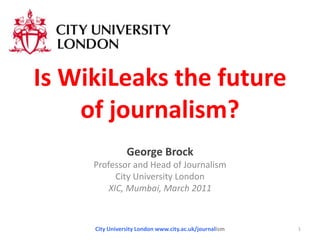
Is Wikileaks the Future of Journalism?
- 1. Is WikiLeaks the future of journalism? George Brock Professor and Head of Journalism City University London XIC, Mumbai, March 2011 City University London www.city.ac.uk/journalism 1
- 2. We can use ideas from Tuesday Recap: Verification Sense-making Eye-witness Investigation Can’t be done by algorithms May even require training City University London www.city.ac.uk/journalism 2
- 4. Phase Two: stateless, uncrackable platform Kenya, Julius Baer, Guantanamo handbooks, Scientology, Kosovo City University London www.city.ac.uk/journalism 4
- 5. Phase Three, 2010: the big time “Collateral Murder” Afghan warlogs City University London www.city.ac.uk/journalism 5
- 6. …and more Iraq warlogs US diplomatic cables City University London www.city.ac.uk/journalism 6
- 7. And this week, in full, India… City University London www.city.ac.uk/journalism 7
- 8. The effects Julian Assange, superstar Original team splits New leaking platform starts ? Tunisia Middle East Wars continue Effects not predictable Arrest/trial of Bradley Manning City University London www.city.ac.uk/journalism 8
- 10. What the mainstream media did Made sense of chaos Minimised harm Projected Adapted to the data dump City University London www.city.ac.uk/journalism 11
- 11. Are secrets right? Julian Assange’s original view: (Journalists’) “original sin” is to enjoy the imbalance of power. Why does someone want to read what a journalist has written? “They’re ignorant and you’re not. You know more.” Journalists treat readers as parents treat children. “You can’t lie, but the opportunity to distort is large and prevalent”. The reader can’t see the whole picture so WikiLeaks has to fill the gap. Once “primary source material” is up on the web, the “lying opportunities” shrink. City University London www.city.ac.uk/journalism 12
- 12. Privacy and transparency People need privacy and are entitled to it But how much? Governments need secrecy Likewise... How much should they be allowed? Does anyone own information? Democracy is a series of managed tensions City University London www.city.ac.uk/journalism 13
- 13. “National security”: US version The balance was asserted in the Pentagon papers case by the late Justice Potter Stewartof the US supreme court. He was su He was sure that the Pentagon papers` publication was not in the national interest, he said, but he could not find that it would “surely result in direct, immediate and irreparable harm to our Nation or its people”. Stewart’s tough test still governs the tense collaboration and competition between the American government and press City University London www.city.ac.uk/journalism 14
- 14. Is it journalism? Your view of its value will depend on you view of society In an open society this will not be fixed Events like WikiLeaks may change the balance of information power. “Assange has claimed, when the history of statecraft of the era is written, that it will be divided into pre-and post-WikiLeaks periods. This claim is grandiose and premature; it is not, however, obviously wrong.” A source and a platform City University London www.city.ac.uk/journalism 15
- 15. WikiLeaks: unexpected effects Nobody died Great PR for the State Department Opportunities for security firms Big bonus for historians No one expected an effect in the Middle East New technologies and their disclosures don’t bring “general and perpetual peace on earth”(the president of GEC’s hope for radio in 1921) City University London www.city.ac.uk/journalism 16
- 16. Further reading On Delicious Georgebrock51 (password: oliver85) Books: WikiLeaks: The Inside Story of Julian Assange’s War on Secrecy (Guardian Books) Inside WikiLeaks: My Time with Julian Assange(Daniel Domscheit-Berg) City University London www.city.ac.uk/journalism 17
- 17. www.georgebrock.net @georgeprof www.city.ac.uk/journalism City University London www.city.ac.uk/journalism 18
